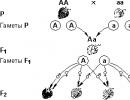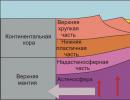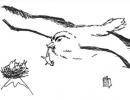Khudyakov’s hero recalls an incident. A collection of ideal social studies essays. sentence structure must be taken into account
A person is characterized by his actions. However, the same person can sometimes be capable of both unprecedented heroism and cowardly betrayal. The text by Mikhail Khudyakov raises the problem of the inconsistency of human actions.
To draw the attention of readers to this problem, the author recalls an incident that made him think seriously.
“I remember everything, I remember in detail, in details, in colors. But I still can’t understand anything.” M. Khudyakov describes the boy Seryozha Leontyev, who stubbornly carried his best friend, who was injured on the shore of a pond, for eight kilometers. However, when a friend, almost unconscious, reveals a secret to him, Seryozha tells it to the whole school. “I still don’t know whether he saved me or betrayed me,” M. Khudyakov’s hero sadly admits, pondering Seryozha’s act.
Many writers have reflected on the problem raised. Let us turn to V. Bykov’s story “Sotnikov” and consider one of the heroes, Fisherman, under various circumstances. At the beginning of the work, Rybak bravely carries the wounded Sotnikov, thereby saving him from German soldiers, risking his own life. But after some time, both of his comrades are captured, and Rybak, frightened by torture and death, reveals secret information of his squad, and then hangs Sotnikov with his own hands, going over to the side of the enemy. Like Seryozha from the text by M. Khudyakov, Rybak, on the one hand, is a hero, and on the other, a traitor...
Let's consider the image of Aksinya Astakhova from the epic novel by M.A. Sholokhov "Quiet Don". For the sake of Grigory Melekhov, the heroine leaves her husband and home, leaves their farm with her beloved, just to find happiness with him. To achieve this, Aksinya is capable of going to any test. But the war begins, Melekhov goes to the front. At this time, the little daughter of Aksinya and Gregory dies due to illness. Grief breaks the woman, and she cheats on Melekhov. Although later she realizes that her heart forever belongs only to Gregory. This is how Aksinya’s love for Gregory is revealed in two ways.
The fabric of life is woven from millions of multi-colored threads, each of which symbolizes our actions and attitudes towards them in different periods of time. All deeds (both good and bad) are reflected in the picture of human life. How heterogeneous the drawings are on it.
Essay on the text
(1) He carried me for eight kilometers. (2) Eight thousand meters on hot ground. (3) I still remember his hot back, the sweat that, like acid, corroded the skin on his hands. (4) And the white distance, like a starched hospital sheet... (5) I remember all this, I remember it in detail, in detail, in colors. (6) But I still can’t understand anything. (7) And today, many years later, when I remember that incident, my wisdom, having lost its balance, helplessly gets stuck in a thick quagmire: our whole life seems incomprehensible and strange to me, especially if you try to understand it.
(8) We were thirteen then - me and my bosom friend Seryozha Leontyev. (9) We went fishing, far away, to an old, shallow pond. (10) I suddenly felt the urge to freshen up, and I climbed into the water, but before I could take a step, I screamed from acute pain in my leg. (11) Seryozhka rushed to me, he dragged me to the shore. (12) I saw with horror that a fragment of a bottleneck was sticking out of my heel, and thick blood was dripping onto the grass. (13) Seryozhka carried me for eight kilometers.
(14) - Seryonya, leave me! - I whispered with dry lips.
(15) - No! - the friend wheezed. (16) It was like in a movie: a friend carries a wounded friend from the battlefield. (17) Bullets are whistling, shells are exploding, but he doesn’t care. (18) He is ready to sacrifice his life, give his heart, his soul, ready to give everything in the world... (19) My head was spinning from weakness, and suddenly, I don’t know why, I said to Seryozha:
(20) - Seryon, if I die, then say hello to Galka Korshunova for me! (21) Tell her that I loved her.
(22) Seryozhka, blowing drops of sweat from his face, tore his T-shirt into shreds and, from fatigue, seemed to no longer understand what I was saying. (23) He dragged me to the hospital, then, breathing heavily, sat on the couch and watched the doctor treat my wound.
(24) And the next day, when I limped out into the yard, everyone already knew that before my death I asked to say hello to Galka Korshunova. (25) I became the laughing stock of the whole school. (26) My appearance now caused convulsions of mocking giggles in everyone, and I, a naturally cheerful boy, became withdrawn and shy to the point of painfulness.
(27) Why did he tell them about my greetings? (28) Maybe he simply outlined all the details of that incident, not assuming that my request would make everyone laugh so much? (29) Or maybe he wanted his heroism to look more impressive against the background of my puny acting? (ZO) I don’t know!
(31) He carried me eight kilometers along a road filled with sunny heat. (32) But I still don’t know whether he saved me or betrayed me.
(ZZ) The scar on my leg has almost completely healed, but my heart is still bleeding. (34) And when they say to me: “So-and-so said hello to you,” I become numb with horror and goosebumps run down my back.
(According to M. Khudyakov)
Option 1
Betrayal is the abuse of someone's trust for your own benefit. You don't have to break any oath to be a traitor, it's enough to let someone down by simply sharing their secret with someone.
This is exactly what Seryozhka Leontyev did from the story by M. Khudyakov. Because of his talkativeness, the narrator became the laughing stock of the whole school (sentences 24, 25). Did Sergei have the right to reveal someone else’s secret, even as a joke? I think not.
And in A. Likhanov’s story “The Broken Doll,” the heroine Masya is betrayed by her closest people - her mother and grandmother, and the girl leaves Life, in which, as it seems to her, no one needs her.
Betrayal is the murder of trust, the most terrible offense that cannot be forgiven.
Option 2
Betrayal is vile behavior, no matter what is behind it - stupidity or truly evil intent. Betrayal is a blow that you don’t expect and that is difficult to forgive.
The narrator in the text by M. Khudyakov also suffered from the betrayal of a friend (sentence 24). It doesn’t matter for what reason Seryozhka betrayed his secret, in any case, he acted vilely.
I understand the feelings of the narrator, because betrayal hurts greatly, even when it is small.
So, one day, for his birthday, I gave my friend Victor my binoculars. Vitya, it seemed to me, happily accepted it, and the next day I heard him speak contemptuously about my gift. It was very unpleasant and painful for me, because I considered Victor my friend and besides, the binoculars were very good.
I don’t wish anyone to face betrayal. This is one of the most unpleasant experiences in a person's life.
Option 3
I understand betrayal as an offense that destroys trust, friendship, sense of duty, and all warm relationships. Betrayal has only destructive power.
Let's look at the text by M. Khudyakov for an example. Seryozhka Leontyev betrays his friend, telling everyone about his feelings for Galka Korshunova (prev. 24). He had no right to reveal someone else's secret!
Andriy from N.V.’s story was also a traitor. Gogol "Taras Bulba". His father killed him, not forgiving his betrayal of his homeland and comrades.
Indeed, betrayal is worthy of condemnation and severe punishment.
Option 4
Betrayal is a behavior of a person, after which there is a complete loss of trust in him. As a rule, a traitor brings pain and devastation.
In the text by M. Khudyakov, the boy recalls how once, having got into trouble and thinking that he would die, he confidentially told his friend Sergei about his love for the girl. But the next day the narrator became the laughing stock of the whole school, because everyone knew about it: Sergei shamelessly shared someone else’s secret with those around him.
This betrayal of a friend changed the boy (sentence 26), and the scar from it remained in his soul for the rest of his life (sentence 33).
Anyone who has thought about such a phenomenon as betrayal will definitely conclude that it burns both relationships and feelings.
Option 5
Betrayal is a violation of loyalty to those who trust you. The betrayer is cowardly, deceives the hopes and expectations of the person who has trusted him, that is, he commits meanness. 162
This is exactly what Seryozhka does in M. Khudyakov’s story. At first, he carries his wounded friend on his back for eight kilometers, but then he tells everyone what no one should have known (sentences 20, 21). This was a betrayal. It brought suffering to Seryozhkin’s friend, which changed him forever (sentences 25, 26). Even time could not smooth out the consequences of this offense (sentences 33, 34).
To avoid this, you need to be honest with other people and not betray them.
This section contains essays from secondary school students. Essays may contain errors...
The problem of betrayal. Based on the text by M.G. Khudyakov.
(1) He carried me for eight kilometers.(2) Eight thousand meters on the hot ground,(3) I still remember his hot back, the sweat that, like acid, corroded the skin on his hands.(4) And the white distance, like a starched hospital sheet...
Composition:
You can start your essay differently. For example:
M.Khudyakov in his text talks about the fine line between heroism and betrayal, asking the question: hero or traitor?
R Thinking about this, the author tells us a story from the life of a boy. Although many years have passed, writes M. Khudyakov, the main character still remembers the horror of that moment when Seryozha Leontyev was carrying his wounded friend, and the boy’s condition is still experienced by him as if this whole terrible nightmare is still going on. In those minutes, the wounded man confessed to his friend about his most intimate thing: his love for his classmate.
B8№ 1482. “Remembering the past war and his “military” generation, Yuri Bondarev uses a technique such as _______ (for example, “We learned that...” in sentences 11, 12, 14). Showing the pre-war attitude of young people, the writer uses such tropes as _______ (“all smiles at that time were intended for you” in sentence 7), _______ (“peace, transparent-radiant" in sentence 8). And such a technique as _______ (sentence 10) helps the author to vividly and concisely tell about the dramatic fate of the war generation.”
List of terms:
1) anaphora
2) incomplete sentences
3) opposition.
4) exclamatory sentences
5) hyperbole
6) epithet
7) dialectism
8) rhetorical question
9) parcellation
(1) One thing is clear to me: the main participants in history are People and Time. (2) Not forgetting Time means not forgetting People, not forgetting People means not forgetting Time.
(3) The number of divisions that participated in a particular battle is calculated with scrupulous accuracy by historians. (4) However, they will not be able to overhear a conversation in a trench before a tank attack, see the suffering and tears in the eyes of an eighteen-year-old girl medical instructor dying in the semi-darkness of a dilapidated dugout, around which burst German tanks are buzzing, or feel the crackle of a machine gun burst killing life.
(5) We were twenty years old then. (6) We dreamed of returning to that sunny pre-war world, where the sun seemed to us like a festive sun, rising above the earth day after day according to its immutable pattern; grass was grass meant to grow; lanterns - in order to illuminate the dry April sidewalk, the evening crowd of people walking, in which you walk, eighteen years old, tanned, strong. (7) All the showers passed merrily over your head, and you were mischievously happy with the flash of lightning and the cannon-like peals of thunder; all the smiles at that time were intended for you, all the deaths and tears were strangers... (8) The whole world, transparent and radiant, lay at your feet in early blue April, warming you with kindness, joy, and the expectation of love. (9) There, behind, there was no fierce intransigence; greenish-light watercolors were spread everywhere in the air; and there were no hard black colors. (10)3 and during the long four years of war, feeling the fiery breath of death near our shoulders, silently passing by fresh hillocks with inscriptions in chemical pencil on tablets, we did not lose the old world of youth in ourselves, but we matured by twenty years and, it seemed, lived them so detailed, so rich that these years would be enough to live on for two generations.
(11) We learned that the world is both strong and unstable. (12) We learned that the sun may not rise in the morning, because its brilliance, its warmth can be destroyed by bombing, when the horizon is drowned in a black-purple curtain of smoke. (13) Sometimes we hated the sun - it promised flying weather and, therefore, schools of Junkers diving into the trenches. (14) We learned that the sun can gently warm not only in summer, but also in the most severe January frosts, at the same time indifferently and mercilessly revealing with its light in all details the recent picture of the battle, the bodies of those killed a minute ago, torn apart by direct hits from guns called by name. (15) We learned about the world along with human courage and suffering.
(16) Time has already touched the memory: details have faded, the faces of the dead are half-forgotten, the smells of trenches torn apart by shells are not so keenly felt in your memories, you do not instinctively duck down on the street at the distant sound of a jackhammer, reminiscent of the battle of a heavy machine gun. (17) When festive rockets flash over the roofs of houses, an involuntary cry does not burst from the throat: “Get down!” (18) You no longer habitually look for a place on the corner, near a pharmacy or department store (a place for a firing position with a wide sector of fire), and the cry of a child accidentally heard at dusk does not bring to mind the black contours of broken villages, the fumes of smoking ruins, charred gardens , crying in the dark.
(19) The long-awaited peace (we walked towards it for four years) firmly entered our consciousness - a world with the shine of the morning sun on the pavements, with the rustle of trolleybuses crowded in the evenings and the cozy fuss of pigeons on the eaves at dawn.
(According to Yu. Bondarev*)
*Yuri Vasilievich Bondarev(born in 1924) - Russian writer, prose writer, author of novels, novellas and short stories. Participant of the Great Patriotic War.
Explanation.
Anaphora - unity of beginning, repetition of a certain word or individual sounds at the beginning of several stanzas, verses or hemistiches. Sentences 11, 12, 14 begin with the words “we learned that.”
Hyperbole is an exaggeration. Often identified by words used in the superlative form. Here the pronoun “everyone” refers to hyperbole.
An epithet is a definition of a word that affects its expressiveness.
Contrast - in sentence 10 there is a contrast “... we have not lost the old world of youth, but we have matured by twenty years...”.
Answer: 1,5,6,3
(1) He carried me for eight kilometers. (2) Eight thousand meters on hot ground. (3) I still remember his hot back, the sweat that, like acid, corroded the skin on his hands. (4) And the white distance, like a starched hospital sheet... (5) I remember all this, I remember it in detail, in detail, in colors. (6) But I still can’t understand anything. (7) And today, many years later, when I remember that incident, my wisdom, having lost its balance, helplessly gets stuck in a thick quagmire of bewilderment: it seems to me that our whole life is incomprehensible and strange, especially if you try to understand it.
(8) We were thirteen then - me and my bosom friend Seryozha Leontyev. (9) We went fishing, far away, to an old, shallow pond. (10) I suddenly felt the urge to freshen up, and I climbed into the water, but before I could take a step, I screamed from acute pain in my leg. (11) Seryozhka rushed to me, he dragged me to the shore. (12) I saw with horror that a fragment of a bottleneck was sticking out of my heel, and thick blood was dripping onto the grass. (13) Seryozhka carried me for eight kilometers.
- (14) Seryon, leave me! - I whispered with dry lips.
- (15) No! - the friend wheezed. (16) It was like in a movie: a friend carries a wounded friend from the battlefield. (17) Bullets are whistling, shells are exploding, but he doesn’t care. (18) He is ready to sacrifice his life, give his heart, his soul, ready to give everything in the world... (19) My head was spinning from weakness, and suddenly, I don’t know why,
I told Seryozha:
- (20) Seryon, if I die, then say hello to Galka Korshunova for me! (21) Tell her that I loved her.
(22) Seryozhka, blowing drops of sweat from his face, tore his T-shirt into shreds and, from fatigue, seemed to no longer understand what I was saying. (23) He dragged me to the hospital, then, breathing heavily, sat on the couch and watched the doctor treat my wound.
(24) And the next day, when I limped out into the yard, everyone already knew that before my death I asked to say hello to Galka Korshunova. (25) And I became the laughing stock of the whole school. (26) My appearance now caused convulsions of mocking giggles in everyone, and I, a naturally cheerful boy, became withdrawn and shy to the point of painfulness.
(27) Why did he tell them about my greetings? (28) Maybe he simply outlined all the details of that incident, not assuming that my request would make everyone laugh so much? (29) Or maybe he wanted his heroism to look more impressive against the background of my puny acting? (30) I don’t know!
(31) He carried me eight kilometers along a road filled with sunny heat. (32) But I still don’t know whether he saved me or betrayed me.
(33) The scar on my leg has almost completely healed, but my heart is still bleeding. (34) And when they say to me: “So-and-so said hello to you,” I become numb with horror and goosebumps run down my back.
(According to M. Khudyakov)
Show full text
What is betrayal? What could it consist of? These questions are asked by M. Khudyakov, the author of the text I read.
Reflecting on the questions posed, the author tells the story of two thirteen-year-old boys. Two friends went fishing, one of them accidentally injured his leg. Seryozha Leontyev carried his wounded friend eight kilometers to the hospital. Exhausted from weakness, the wounded boy asked his friend to tell Galka Korshunova that he loved her. Seryozha committed a heroic act, not leaving his friend in trouble, but unfortunately, he also turned out to be a traitor, as he told the whole school about his friend’s confession. The hero cannot understand: why, having committed a heroic act, Seryozha then betrayed him? This incident made the author think about what betrayal is.
Author's position is that: Betrayal is the worst quality of a person. Mental wounds are much more painful than physical ones. Due to Seryozha Leontyev’s treacherous act towards his friend, the boy’s heroism remained in the shadows.
In A.S. Pushkin’s novel “The Captain’s Daughter,” Alexey Ivanovich Shvabrin is a vile and dishonest person. Milk him to betray Comrade
Criteria
- 1 of 1 K1 Formulation of source text problems
- 2 of 3 K2






